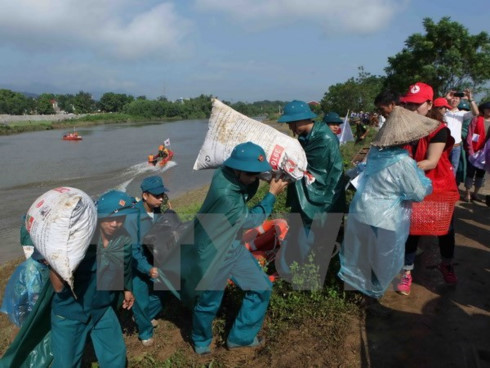
Prime Minister Nguyen Xuan Phuc on October 30 conveyed a message to mark the 20th year of devastating Typhoon Linda – the worst to strike the Mekong Delta in 100 years, in which he called on people to stay vigilant and play a more active role in response to natural disasters.

The powerful,
unexpected and unusual Typhoon No.5, also known as Linda, tore through the
Mekong Delta, rarely hit by storms, during the night of November 2, 1997, PM
Phuc said in the message.
The typhoon caused heavy losses of life and severe property damages, especially
for Ca Mau province, he recalled, adding that thousands of fishermen and boats
sank at sea while many houses and regional infrastructure were destroyed.
Two decades later, the pain of families who lost kith and kin in the storm is
still there and on behalf of the government, Phuc extends his deepest
condolences and sympathies to all affected people. He also acknowledges the
efforts made by soldiers and disaster response forces in providing relief to
the victims.
The PM went on to say that natural disasters have become much more complicated
and hard to be predicted in recent years while climate change impacts, forest
degradation in coastal protected areas, erosion and sea level rise are among
factors increasing vulnerability when natural disasters hit the delta.
"As lessons learnt from Typhoon Linda, I call on people, soldiers and disaster
response forces nationwide, including from the Mekong Delta, to be vigilant,
get prepared for and proactive in response to natural disasters so as to
minimize losses,” he wrote.
Natural disasters in Vietnam have killed hundreds of people and destroyed
thousands of houses, causing an economic loss of over 35 trillion VND (1.54
billion USD) since the beginning of this year.
According to the Ministry of Agriculture and Rural Development, heavy rains and
floods on August 2-3 and October 9-
10 in Thanh Hoa, Hoa Binh, Yen Bai and Son La
provinces left 91 people dead or missing and 356 houses completely damaged or
lost. It estimated total property losses at over 8.5 trillion VND (377.7
million USD).
Source: VOV
The emulation movement "Hoa Binh joining hands to build new-style rural areas” has been widely spreading, becoming a driving force that motivates the localities to renew rural landscapes and improve the material and spiritual lives of the residents. In this movement, the people play a central role-both as the main implementers and direct beneficiaries of its outcomes.
In response to the global digital revolution, Hoa Binh Newspaper is transforming itself into a modern and multi-platform media hub, blending cutting-edge technology with a restructured newsroom and a new generation of tech-savvy journalists.
Hoa Binh province’s Association of the Elderly recently held a conference to review the project on expanding the inter-generation self-help club model until 2025.
In a move to implement Resolution No. 57-NQ/TW, issued on December 22, 2024 by the Politburo, which targets breakthroughs in science-technology development, innovation, and digital transformation, the Hoa Binh provincial Department of Health has issued a plan to roll out the "Digital Literacy for All” campaign within the local health sector.
An Nghia Commune (Lạc Sơn District) is one of the communes that achieved the tha standard of the national new rural area in 2018. Entering a new development phase, the commune is now trying to meet the criteria for the advanced new rural development. With the strong political will and the public consensus, the commune is gradually overcoming the challenges to reach this goal, aiming for the sustainable development.



